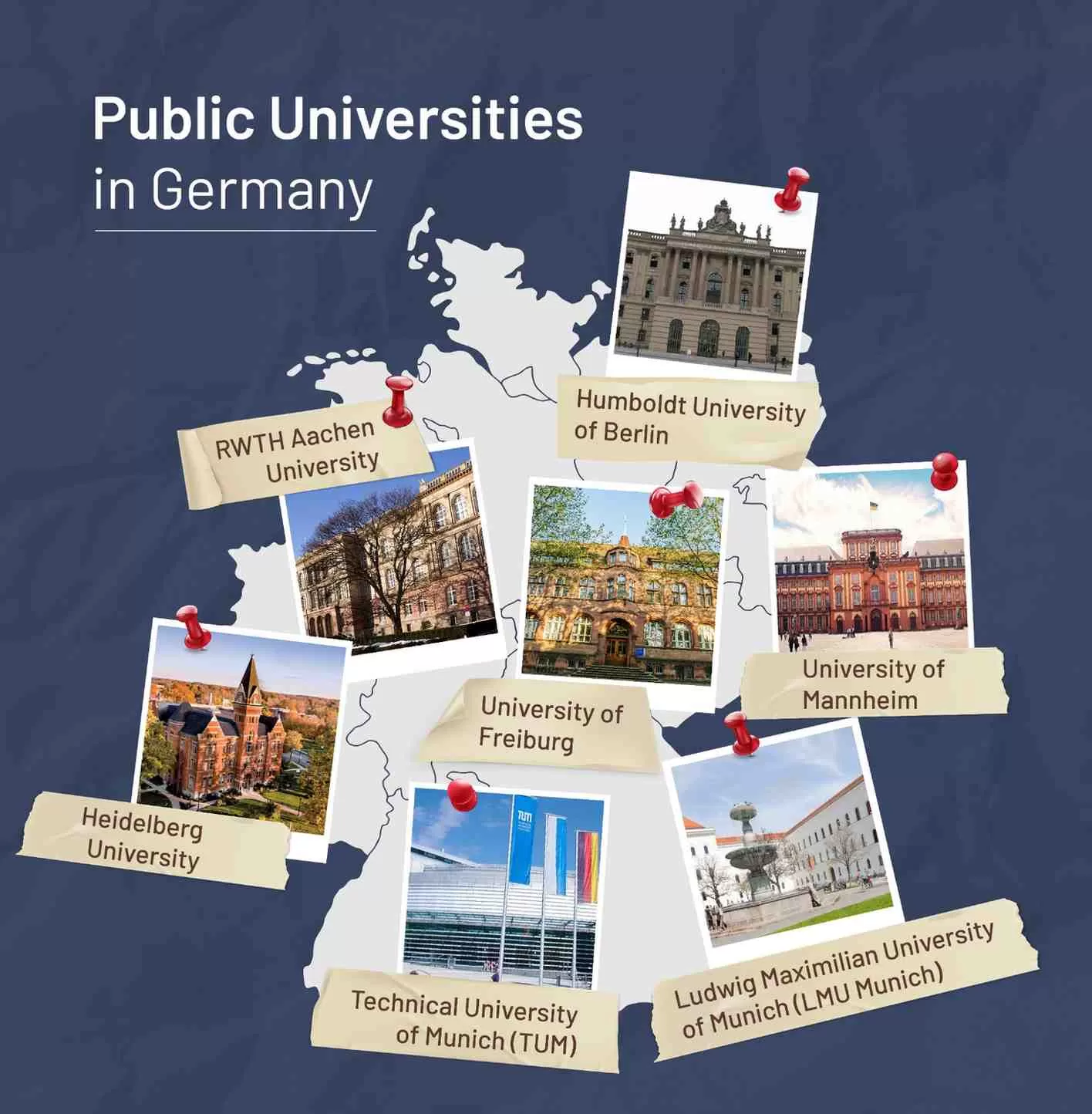
Best Public Universities in Germany

Germany is one of the premier destinations for students’ higher education worldwide. Its world-class education system, well-ranked universities, and low-cost education attract thousands of students every year.
It is not just pirate universities that are sought after, but also public universities in Germany are sought after. They are known for their academic standards, research opportunities, and globally-recognised degrees.
This guide will list the public universities in Germany, their benefits, the admission process, and student life. So that you can make an informed decision about studying in Germany.
Why Choose Public Universities in Germany?
Here are some of the reasons why you must choose Public Universities in Germany:
- Minimal Tuition Fees – Most Public Universities charge a minimal fee or do not charge any fee at all for undergraduate programs. Only Baden-Württemberg University is the exception as it charges international students a nominal fee.
- High Academic Standards – German universities have high academic standards which is why their degrees are globally recognized.
- Diverse Course Options – German universities offer a wide range of programs in STEM, Humanities, business and more.
- Strong Industry Connections – They collaborate with various global industries, providing job and networking opportunities.
- Post-Study Work Opportunities – Germany allows international students to work after they graduate.
Top Public Universities in Germany
Germany is home to some of the world’s best public universities. Here’s a list of top-ranked universities:
| University Name | Location | Key Highlights |
|---|---|---|
| Ludwig Maximilian University of Munich (LMU Munich) | Munich | It is one of the oldest and prestigious universities of Europe |
| Technical University of Munich (TUM) | Munich | Known for its strong industry ties in the realm of engineering and technology. |
| Heidelberg University | Heidelberg | It strongly focuses on medical and life sciences. |
| Humboldt University of Berlin | Berlin | It is famous for its research-driven programs in humanities and life sciences |
| University of Freiburg | Freiburg | It has a research-oriented curriculum and offers interdisciplinary programs |
| RWTH Aachen University | Aachen | A university known for its engineering and natural sciences programs |
| University of Mannheim | Mannheim | Known for its strong business partnerships |
These universities provide high-quality education with modern facilities, ensuring an excellent learning experience.

Admission Process for International Students
While the admission process for many universities may vary depending on the type of programs that are chose, we will present some of the common criteria that all universities have:
Eligibility Criteria
- 12 years of schooling or equivalent qualification.
- Bachelor’s degree when applying for master’s program
- Relevant entrance exams (wherever applicable)
Language Requirements
- Although German is the primary language, the programs are offered in German as well.
- For programs taught in German, TestDaF or DSH is neededFor German-taught programs, TestDaF or DSH is required.
- IELTS or TOEFL scores are required for English-language programs.
Application Process
- Choose a University & Program – Select a course that matches your academic and career preferences
- Check Requirements – Each university has specific requirements. You can check on their websites to know them.
- Apply via Uni-Assist or Directly – Some universities accept applications through the Uni-Assist platform.
- Submit Required Documents:
- Academic transcripts
- Language proficiency proof
- Statement of purpose
- Letters of recommendation
- Resume (if required)
- Application Deadlines –Usually July 15 is the application deadline for the winter intake while January 15 is for the summer intake.
- Visa Process –Once you have received your admission letter, apply for a German student visa.
Scholarships & Financial Aid
- DAAD Scholarships – Gives scholarships for international students.
- Erasmus+ Program – EU Scholarship for foreign exchange studentsEU scholarship for exchange students.
- Deutschlandstipendium – Gives financial aid for exceptionally performing students.
Life as a Student in Germany
Now what will life as a student look like in Germany? You will have to factor in various factors such as cost of living, accommodations etc, to get an overview:
Cost of Living
| Expense | Average Cost (Per Month) |
|---|---|
| Rent | €300 – €600 |
| Food | €200 – €300 |
| Transportation | €70 – €100 |
| Health Insurance | €110 – €120 |
| Miscellaneous | €100 – €200 |
- Student discounts are available for transport, museums, and cultural activities.
- Many universities provide subsidized meal plans.
Accommodation Options
- Student Dormitories – Affordable and located near university campuses.
- Shared Apartments (WG) – Popular among students, offering lower costs.
- Private Housing – Expensive but provides privacy.
Part-Time Job Opportunities
- Students can work 20 hours per week during the semester and full-time during breaks.
- Common jobs: Research assistants, tutors, retail, hospitality, and internships.
Cultural Experiences & Travel
- Germany’s central location allows easy travel across Europe.
- Rich cultural heritage with historical sites, festivals, and modern attractions.
Health Insurance
- Mandatory for all students.
- Public health insurance – Costs around €110/month.
- Private insurance – Available for older students.
Conclusion
Germany offers superb education through its public universities, making it a top-choice for international students. With zero to minimal fees, top-ranked colleges, strong research opportunities and excellent career prospects make Germany a right choice for pursuing a higher education.
If you’re planning to pursue higher education in Germany, start your research early, understand the admission requirements, and prepare accordingly.
For expert guidance, Zeiq Consultants, a leading abroad education agency in Kerala, provides end-to-end support, including application assistance and German language training.
FAQs
Frequently Asked Questions
This guide provides everything you need to know about studying in Germany. Start your journey today with Zeiq Consultants and explore world-class education opportunities!

